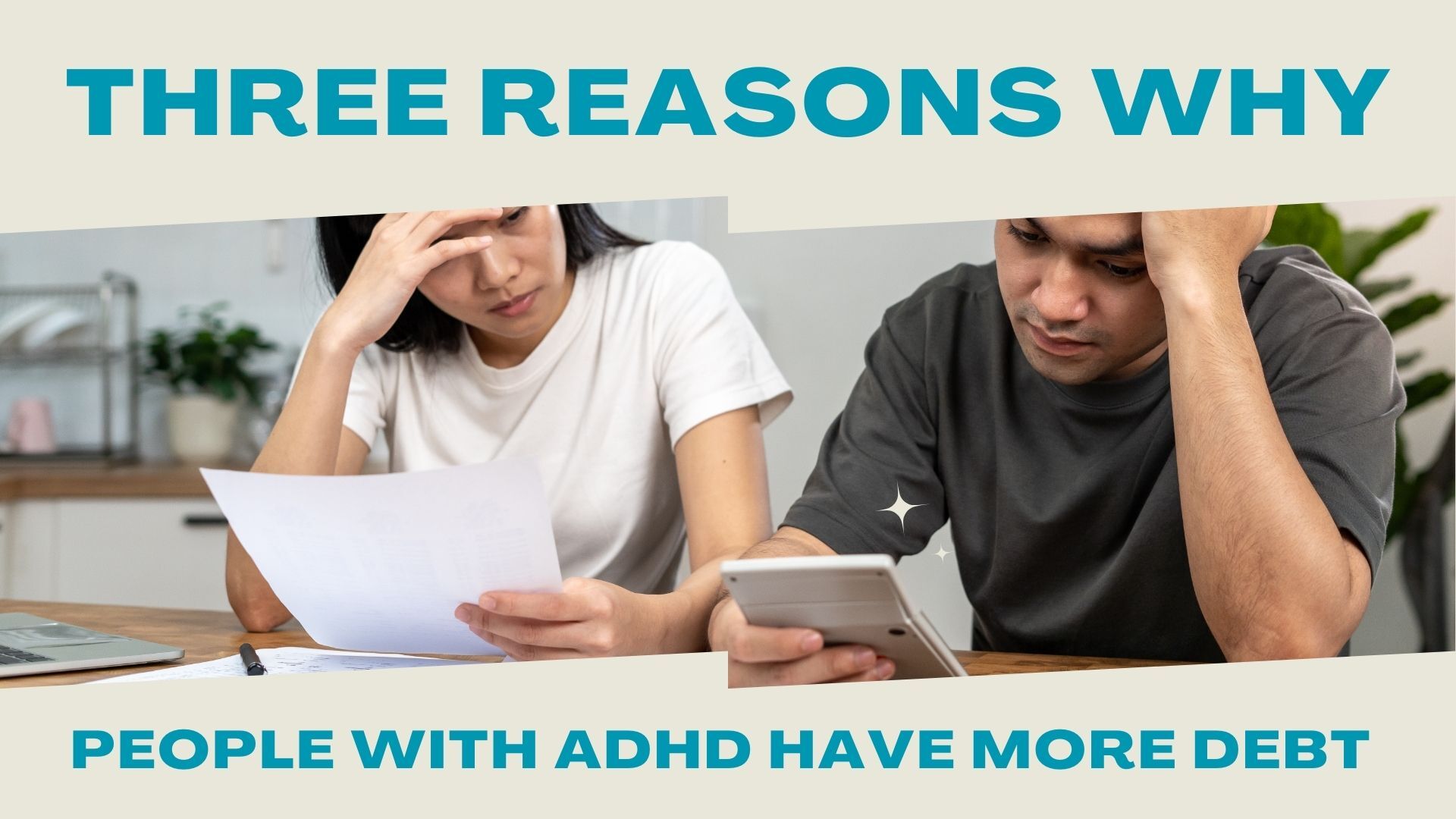Three Reasons Why People with ADHD Have More Debt
Three Reasons Why People with ADHD Have More Debt and some tips to help get on top of your finances

ADHD affects millions of people worldwide. It can make it hard to concentrate, organise, and manage impulses. These challenges often lead to financial problems. Research shows that people with ADHD are more likely to have serious debt compared to those without ADHD. A study found that adults with ADHD are three times more likely to be in serious debt and twice as likely to have poor credit. Understanding why this happens is key to finding solutions. Here are three reasons why people with ADHD tend to have more debt and how they can handle these issues.
Impulsivity and Poor Decision Making
Impulsivity is a common symptom of ADHD. This can lead to impulsive spending. People with ADHD can struggle to resist making spontaneous purchases, which can quickly lead to financial problems. This isn't just about small items; it can include big purchases like electronics, cars, or even homes.
Example: Sarah, a 32-year-old with ADHD, often makes unplanned purchases. Her impulsive spending, from expensive coffee to shopping sprees, has led to a large credit card debt.
Why It Happens: The impulsivity in ADHD is linked to the brain's reward system. The immediate pleasure from buying something can overshadow long-term financial goals.
Difficulty with Organisation and Planning
ADHD often makes it hard to organise and plan. Managing money requires attention to detail, paying bills on time, and budgeting. People with ADHD might struggle to keep track of their expenses, miss payment deadlines, or fail to plan for future needs.
Example: John, a 45-year-old marketing executive with ADHD, often forgets to pay his bills on time. Despite earning a good income, his poor organisational skills lead to late fees and a lower credit score.
Why It Happens: ADHD affects the brain's executive functions, which are essential for planning and organising. This makes it tough to maintain a budget, remember due dates, and prioritise spending.
Procrastination and Avoidance
Procrastination is another issue for people with ADHD. Managing finances can seem overwhelming, leading to avoidance. People might delay dealing with their financial situation until it becomes urgent, causing more debt and financial chaos.
Example: Emma, a 28-year-old freelance graphic designer, avoids checking her bank account because it stresses her out. She often doesn't realise she's overdrawn until it's too late.
Why It Happens: Procrastination in ADHD is often a way to avoid anxiety and stress related to complex tasks. Unfortunately, this only makes financial problems worse over time.
How to Combat Debt if You Have ADHD
Knowing why financial difficulties happen is the first step. The next step is to use strategies to handle these challenges. Here are three ways people with ADHD can manage debt and take control of their finances.
1. Automate Financial Processes
Automation can help with impulsivity and disorganisation. Setting up automatic bill payments or direct debits ensures deadlines are met and essential expenses are covered without constant attention.
Tips:
- Use automatic transfers to move money into savings accounts.
- Set up Direct Debits for recurring bills like rent, utilities, and credit cards.
- Use budgeting apps that help categorise expenses and track spending.
2. Create a Simple Budgeting System
A simple, structured budgeting system can help manage money better. Break down your budget into easy-to-manage categories and review it regularly.
Tips:
- Use the envelope system, putting cash into envelopes or digital pots for specific spending categories.
- Try apps like YNAB (You Need a Budget) or Mint to track spending and set financial goals. At Rule we've created a budgeting game designed for people with ADHD that we believe makes the process of budgeting more fun and less intimidating.
- Schedule regular financial check-ins to review your budget and make adjustments.
3. Seek Professional Help
Sometimes managing finances with ADHD can be overwhelming. Getting professional help can make a big difference. Financial advisors or coaches can offer personalised strategies and accountability.
Tips:
- Find a financial advisor experienced with ADHD clients.
- Consider seeing a therapist who specialises in ADHD to address underlying issues affecting financial management.
- Join support groups for people with ADHD to share experiences and strategies. We've got a dedicated ADHD and Money Community where you can find likeminded people and share stories or gain support.
Conclusion
Managing finances can be especially challenging for people with ADHD. But understanding the underlying issues can help in developing effective strategies. By automating financial processes, creating simple budgeting systems, and seeking professional help, those with ADHD can manage debt and achieve better financial stability. While the journey may require extra effort and support, the rewards of financial peace and stability are well worth it.